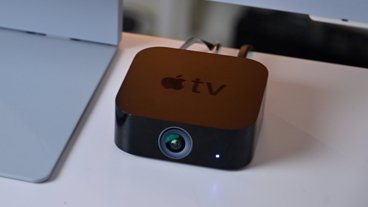Apple exec Tim Cook talks Apple TV, iPad A4 processor, more
Apple TV "still a hobby"
Cook said he believes the Apple TV is an outstanding product, but there just isn't a large enough market to make the hardware worth a great deal of concentration from his company. The product is a "hobby," he said, because it doesn't compare to the phone, computer and MP3 player markets in terms of sales.
"Apple TV is still a hobby," he said. "We've been very clear about that."
But he also suggested the company's set-top-box device wouldn't necessarily lay dormant. It may just take time for the potential market to grow.
"Because our gut says something's there, we're continuing to invest in this," he said. "But today, it's still just a hobby."
Last October, Apple released the 3.0 software update for Apple TV, featuring a redesigned main menu that made navigating content simpler and faster. It also added support for the new iTunes LP and iTunes Extras formats.
Future products to feature custom silicon
Unsurprisingly, Cook said that future Apple products will feature custom-built chips, much like the new A4 processor found in the forthcoming iPad. He said Apple became wary of purchasing chips from other companies designed for different tasks.
"We felt that we had the best knowledge of what we wanted the silicon to do," he said.
By designing its own silicon, he said, Apple can create chips that are best-suited for the company's products, allowing them to run cooler and more power efficient.
"Apple has, for years, been in the silicon design business," he said. "When we were on the PowerPC architecture, Apple always personally crafted the northbridge and southbridge chipset, and so it's not new to us."
Keeping it simple
One focus for Apple, Cook revealed, is to keep matters simple. The Cupertino, Calif., company hasn't been interested in doing large acquisitions because of value and compatibility issues.
"We've always been about making the best product, not having the highest market share or the highest revenue," he said. "And so acquiring a company so our revenue gets larger isn't something that drives us."
The same philosophy applies to Apple's product line. Cook said the company doesn't want to overextend itself, and noted that the company's entire line of products could fit on one table. The only other high-revenue, publicly traded companies that could likely say that would be oil companies, he said.
Most companies, he said, simply aim to get bigger as they become more successful, but Apple has intentionally avoided that approach.
"The management team at Apple would never let that happen," Cook said. "That's not what we're about."
Other notes of interest:
- Apple scaled back building stores during the recession, but is picking up steam again in building new retail outlets. He said forthcoming Apple stores in Shanghai and London will "make your jaw drop."
- Recent NPD data shows Apple with a 22 percent unit share of desktop sales, with 42 percent of revenue. Cook said he believes the new iMac is the best desktop on the market. "I think people will continue to want a very gorgeous, large screen, all-in-one, simple to use, very elegant machine, and we're going to continue to deliver it."
- With 300 million total worldwide PC sales per year, Cook said there is plenty of room for Apple to grow the Mac platform. The company's biggest target remains Windows switchers. "What we have to do is convince Windows users to switch, and we can provide a much better experience than they (Microsoft) can."
- The single-carrier model seen with the iPhone and AT&T in the U.S. allows for simplicity and innovation. Without a partnership with AT&T, Apple likely wouldn't have been able to implement visual voicemail with the initial iPhone.
- The Mac OS is "amazingly scalable," ranging from Mac computers to the iPhone, iPod touch and iPad. In a joke about Microsoft that earned laughter, he said the scalability of Mac OS X gives Apple an advantage over others who are "geographically north."
- The iPod touch has been an integral part of the success of the iPhone OS. Every device they sell, he said, helps to fuel more application sales from the App Store. "The iPod touch has been a runaway hit," Cook said.
 AppleInsider Staff
AppleInsider Staff










 Malcolm Owen
Malcolm Owen
 William Gallagher and Mike Wuerthele
William Gallagher and Mike Wuerthele
 Christine McKee
Christine McKee
 William Gallagher
William Gallagher

 Marko Zivkovic
Marko Zivkovic









